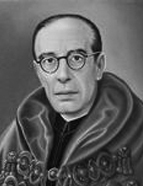

Born on 2 September 1889, Manuel Paulo Merêa was described by António Manuel Hespanha as "the most important historian of law in contemporary times" (Hespanha, A. M., "Historiografia..." [Historiography...], 1982, p. 807). Born in Lisbon, the son of Adriano Merêa — a literary critic, piano teacher at the National Conservatory, and author of the art collection crónicas Musicais [musical chronicles] — Merêa initially wished to study philology at the Curso Superior de Letras in Lisbon (then the only higher institution for literary studies in Portugal) after completing his studies at the Liceu do Carmo. However, he ultimately enrolled at the Faculty of Law in Coimbra in 1906, where he studied alongside António Sardinha, Cabral de Moncada, and Hipólito Raposo, among others. In Coimbra, Paulo Merêa began his career in the history of law and institutions, publishing his first book in 1912 (at the age of 22), a work he completed while pursuing his law degree (1906-1911). Origens do Feudalismo e Caracterização deste Regímen [The Origins and Characterisation of Feudalism]. This was followed by Evolução dos Regimes Matrimoniais: Contribuições para a História do Direito Português [The Evolution of Marriage Regimes: Contributions to the History of Portuguese Law] (2 vols.), in 1913. These were not his first noteworthy works. In 1910, following the establishment of the Republic and the appointment of Manuel de Arriaga as rector of the University, he delivered a lecture titled "Idealism and Law". The main ideas of this text included: "the opposition to scientific monism, emphasising the importance of all methods by which the human spirit can engage with reality; the opposition to intellectualism, valuing practical (W. James) and intuitive (Bergson) approaches for understanding reality; the opposition to monism, underscoring the 'redundancy' and 'overabundance' of experience; and humanism, restoring humanity to the centre of the cosmos and combating its objectification by sociologists." (Hespanha, Idem, p. 798). It is worth mentioning that this lecture was written after he had taken a break from his studies due to a health issue in 1908-1909. While in Lisbon during this period, he took the opportunity to attend various classes, notably those of Adolfo Coelho at the Curso Superior de Letras [a higher education institution focused on History, Philosophy and Literary Studies].
This work is financed by national funds through FCT - Foundation for Science and Technology, I.P, in the scope of the projects UIDB/04311/2020 and UIDP/04311/2020.
